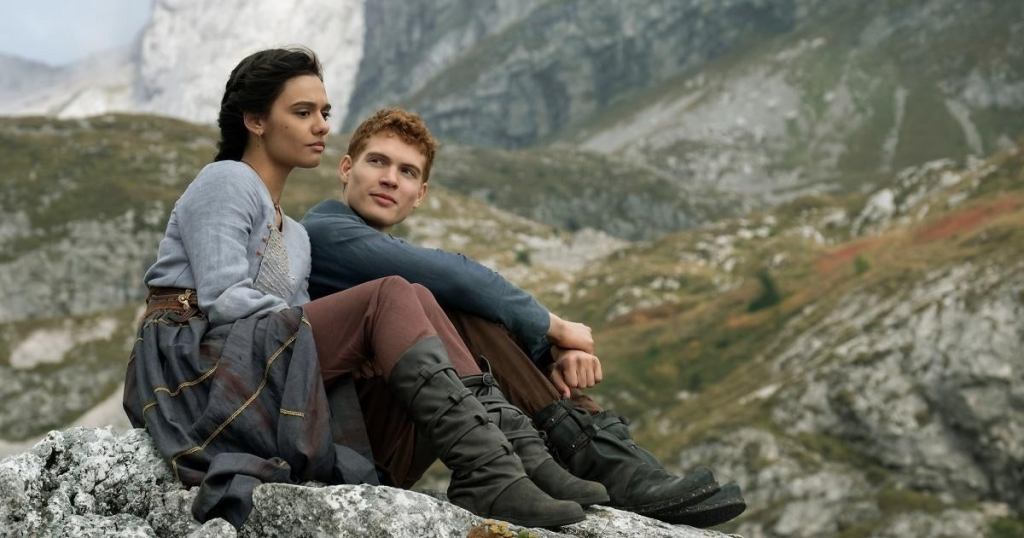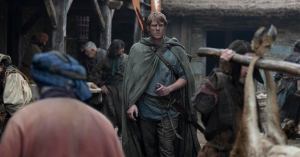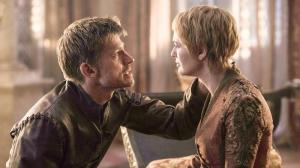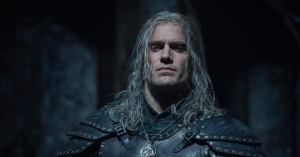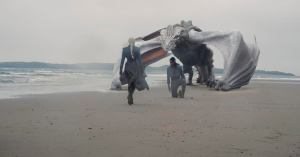If there’s one thing all fantasy fans are familiar with, it’s lofty prophecies, and for years fans of the genre have believed that a screen adaptation of The Wheel of Time would take the world by storm. We’ll find out for sure if that’s true in the weeks to come, but having seen the first three episodes of the series, my hopes are already high. The Wheel of Time uses its legendary status in the genre to please old fans, invite in new ones and steer the course of an adaptational trend that is on track to match the comic book movie industry over the next few years.
Fair warning: there are spoilers for the first three episodes of The Wheel of Time ahead!
Videos by PopCulture.com
The Wheel of Time is set in one of the largest, most detailed high fantasy worlds ever developed, and the show spares no expense in highlight this scale. The aerial shots of misty mountains and rustling forests invoke The Lord of the Rings films, while the ominous politicking monologues invoke Game of Thrones. Tired as they sound, The Wheel of Time does not shy away from these comparisons, and at times even seems to invite them. That may be because the show knows it is blazing a fresh path in so many other ways.
The show is based on a book series by the same name written by Robert Jordan and finished by Brandon Sanderson based on Jordan’s notes after his death. There are 14 books in the main series, plus one prequel novel and an encyclopedia-style companion book. That gives the show a lot to live up to and a lot of material to cover, and it lets you know early on that the pace of the story will be changed on screen.
Generally speaking, that’s probably a good thing for Wheel of Time. Some of the revisions include planting characters earlier in the story so that they’ll have a greater payoff later on — for example, the Children of the Light, a.k.a. the White Cloaks. The show gives a surprising amount of screentime to these fanatics compared to Jordan’s first novel, but that will make it easier to incorporate them into the story as the series progresses.
Other changes play to the series’ thematic strengths of balance and destiny — for example, Moiraine’s (Rosamund Pike) declaration that any of the five main characters might be the Dragon Reborn. In the books, only a man could be the Dragon Reborn, but the fact that women are under consideration too actually works well with the story’s themes and Jordan’s world-building. This way, it makes more sense that certain sects of the Aes Sedai would be intent on rooting out all men who can channel, believing that their prophecied savior will most likely be a woman anyway.
Still, changes to the source material are always a huge risk in a franchise this popular, and will inevitably raise doubts at the very least, if not full-on dislike. For me, the foundational changes to the backstories of Perrin (Marcus Rutherford) and Mat (Barney Harris) are alarming, and they still have my guard up for now. I am waiting to see how these changes pay off as the characters develop to pass final judgment, but for now, I can’t quite imagine why they were necessary.
Still, even dubious changes can’t overshadow the obvious love and care that went into writing this series, which is gratifying for fans in the short term and essential for success in the long term. As it is, there’s no doubt that The Wheel of Time could go all the way to tarmon gai’don like this, as long as it gets its chance. Amazon has clearly hurled money at this endeavor, which seems like a good sign, but there’s always the concern that fans will stop the momentum in its tracks either with disinterest or outright disdain.
Some will likely complain about the CGI, which is not quite blockbuster quality and is perhaps overused a bit. Personally, I found this to be a brief distraction until my mind adjusted to it, but others may find this more difficult. They may even decide that the visual tone of the show doesn’t match with what they had in mind — a difficult hurdle to overcome, to say the least.
That’s the point on which fans should be prepared to give The Wheel of Time and other upcoming adaptations some slack. These series cannot and should not all look the same, in spite of our ceaseless, click-hungry hunt for “the next Game of Thrones.” The fantasy genre is broad and varied, and unlike comic book adaptations, they do not all come from one or two publishers, one or two shared universes. They each need the space to find their own tone, but if we give them the chance to do so the genre could bring all its myriad worlds to life in their own unique, diverse way.
The Wheel of Time seems like the perfect series to establish that trend of uniqueness, and for that if nothing else, it is already a success. The series stretches the imagination beyond a realm that can be summed up as “basically medieval England with real dragons” to a setting with no ties to real-life culture, a completely speculative economy, and endless possible utopias and dystopias to explore.
The Wheel of Time premieres on Friday, Nov. 19 on Amazon Prime Video with three episodes to start, then one episode per week after that. Season 2 is in production now.

